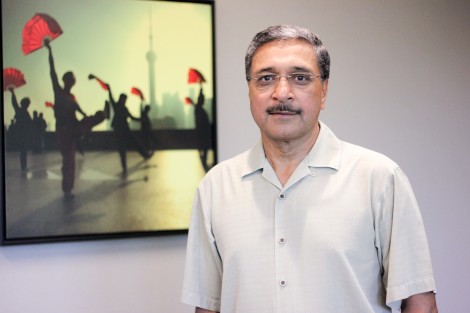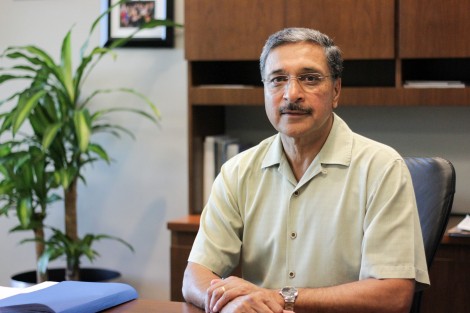At the end of July, Deep Saini, current principal of UTM and vice-president of U of T, will leave Canada for the position of vice-chancellor of the University of Canberra in Australia. The Varsity met with Professor Saini to discuss his future plans and look back at his time at UTM.
The Varsity: Why did you decide to leave your current position?
Deep Saini: I’m in my second term, and it does happen to people when that’s about the time when opportunities come elsewhere. So it was essentially the direction of a very exciting new opportunity and in an exciting new location. And I thought about it and I said, look if I’m going to do anything like this, now is the time to do it, so that was it.
TV: What was one of your greatest accomplishments as principal?
DS: I think there’s an abstract notion it’s some ways repositioning the University of Toronto Mississauga as a university campus that is the leading campus that serves the western GTA, and through that repositioning the University of Toronto as the university for the entire GTA and not just Toronto. And so that was my kind of the mission at the back of my mind and I think we’ve largely succeeded [at] that. We are seen as the university for western GTA and not just simply a satellite campus of the University of Toronto just doing some things here. We are seen as a comprehensive university … on its way to becoming even more comprehensive.
TV: What do you like most about UTM and how does it differ from the other U of T campuses?
DS: I like the culture on this campus. People, people are the centre of that culture. There’s a very close-knit, family type of an atmosphere on this campus. It’s large but small at the same time. Large in the sense we have now over 14.000 students on this campus, which puts us in the top 30% of the universities in the country enrollment wise so it’s not a tiny place anymore but there is that atmosphere of a close-knit community that still dominates the culture of this campus.
TV: What will you miss most about UTM and U of T in general?
DS: We live on the campus and there’s a house that comes with the job. And that gives us this constant access to the life on campus. And my wife and I are very involved [in campus life], particularly with students after hours and so on. We go for walks and run into students in the residence and at the Blind Duck Pub and so on. It’s going to be [a] similar thing in Canberra because again there’s a house on the campus, but that’s not going to stop me missing this aspect of our life at UTM. I’m going to miss the people from this place, particularly students. I have a very, what I regard as very special relationship with our students and I’m going to miss them.
TV: What are your plans as vice-chancellor and what do you hope to accomplish in your new position?
DS: There are two major things to do at University of Canberra. One is that it’s a young university. There are not many similarities between University of Toronto and University of Canberra. University of [Toronto] is [an] old venerable institution. University of Canberra is an upstart, disruptive university that is doing things in different ways than the traditional universities have done, but it’s also a university that’s rising very rapidly through the international rankings. Last year it made it into the top 100 young universities in the world in Times ranking, for example. So the plan is now to take that ambitious, disruptive university and take it to the next level.
… The second thing is that along with that there is a very interesting campus development project. It’s a project that’s uniquely conceived as a university that is developed as a part of the community where you bring the community into the university, in both functional and physical sense, and create strong links between two.
TV: You went to school in Australia.
DS: I did my PhD in Australia.
TV: So what are you most looking forward to seeing and doing when you’re there again?
DS: It’s an interesting thing. I mean I’ve reflected a lot on that. I went to Australia as a student 38 years ago. So it was a long time back and Australia was a very different country. Let me come out and say it very frankly: one of the things that has changed in the country is the inclusion of diversity. When I finished my PhD, I mean, there were a few people in academic positions who were non-whites. Just aspiring to a lectureship or something in the university was a big deal for somebody who was not white. So that was the environment in which I was educated.
… Now to go back to a country where I will be the first university president or vice-chancellor of colour, I don’t know if you know that, it will be the first time that a university in Australia would appoint a president who is not white. I think that’s a fantastic statement on the evolution that has happened in the country.
On a lighter side, my wife and I went together to Australia. We got married because I was going to Australia so we had our start in Australia. But we were poor. You know I was a student and barely scraping by. So we saw some of the country but not as much as we would have liked to. And then we left. Now to go back when we’ll have a little bit better income to be able to explore the country so that at the personal level I find an exciting opportunity.
TV: What do you hope for the future of UTM?
DS: I hope that UTM will continue to grow as it has been growing, not just simply quantitatively, that is in its enrolment and size and so on, but qualitatively in terms of what we offer here, the diversity of programs offered, particularly more professional programs. That was my vision for UTM. If I had stayed, I would have worked on introduction of more professional programs into the campus.
I am hoping very much that with this transformation that’s happening at UTM and a parallel transformation that’s happening at UTSC as well that University of Toronto will be positioning itself more and more as not just simply a university with a central campus and two satellites but as three equally important campuses of one university.
TV: Finally, do you have any parting words for students?
DS: Don’t forget me. Remember the great time we had. And a number of them are my Facebook friends and I’d like to stay friends with them.
This interview has been edited for clarity and length.




